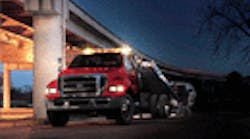Ford Motor Co. is aiming to drastically change the future production plans for its F-650 and F-750 medium-duty trucks all while introducing a new full-size van model that will replace its venerable E-Series workhorse over the next decade.
For starters, in three years Ford and Navistar International plan to end their decade-long Blue Diamond Truck LLC joint venture that currently manufactures Ford F-650 and F-750 trucks in Escobedo, Mexico for the North American market.
Ford then plans to shift construction of the F-650 and F-750 to its Avon Lake, OH, assembly plant, along with the F53 motor home chassis and F59 commercial stripped chassis. That plant currently builds the E-Series van, which will be phased out over the next 10 years.
View more photos of F-650 and F-750 medium-duty trucks. (Photo 1) (Photos 2)
A new full-size van called theFord Transit – based on a global platform and currently built in Europe – will begin production in 2013 at Ford’s Kansas City Assembly Plant in Kansas City, MO. This van will eventually replace the E-Series in North America, though both will be offered side by side until the E-Series is finally phased out.
Both of those moves result in part from the labor agreement ratified last week between Ford and 41,000 employees represented by the United Auto Workers (UAW) union.
Over the new four-year UAW contract, Ford plans to add 12,000 hourly jobs in its U.S. manufacturing facilities including in-sourcing work from Mexico, China and Japan. On top of that, there will be $16 billion worth of investments made in U.S. product development and manufacturing operations – including $6.2 billion in plant-specific investments – by 2015.
To support its medium-duty manufacturing plans, Ford said it will invest $128 million in its Ohio facility, along with $1.1 billion – $700 million more than was previously announced – in its Kansas City plant, where the full-size Transit and next-generation F-150 will be built.
Mark Fields, Ford president of The Americas, said the two truck production changeups are geared to do nothing less than help reinforce and potentially advance the OEM’s position in the U.S. truck market
“By moving our commercial vehicle production in-house, we will be able to streamline and strengthen the engineering and manufacturing of our next-generation medium-duty trucks,” Fields explained. “More importantly, this shows that Ford is truly committed to investing in the U.S. and doing our part to support U.S. manufacturing, which is critical to our country’s ability to compete.”
Mike Levine, Ford truck communications manager, added that the addition of a 6.8-liter V10 Triton gasoline engine to the 2012 F-650 and F-750 is another effort by the OEM to broaden the appeal of those medium-duty trucks to North American customers – a follow-on effort of sorts to the rollout of hybrid versions of Ford’s medium-duty lineup back in July.
Levine told Fleet Owner that replacing the E-Series with the full-size Transit van is also an example of how the OEM is moving to global vehicle platforms that are then “tailored” to the needs of individual markets.
“We recognize that North American truck customers have different needs that those in say Asia or Europe,” he said. “So, while the Transit is a global vehicle platform like the Fiesta [a Ford compact car], it will be a North American-focused product.”




